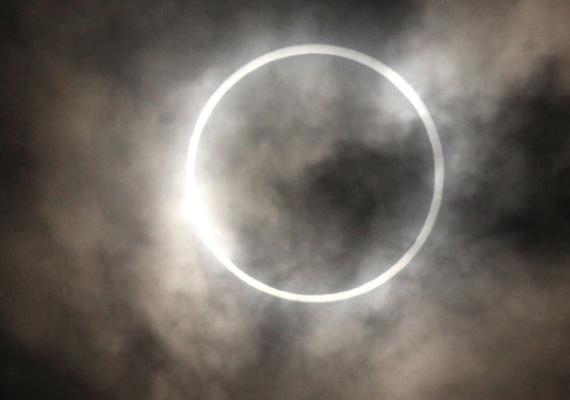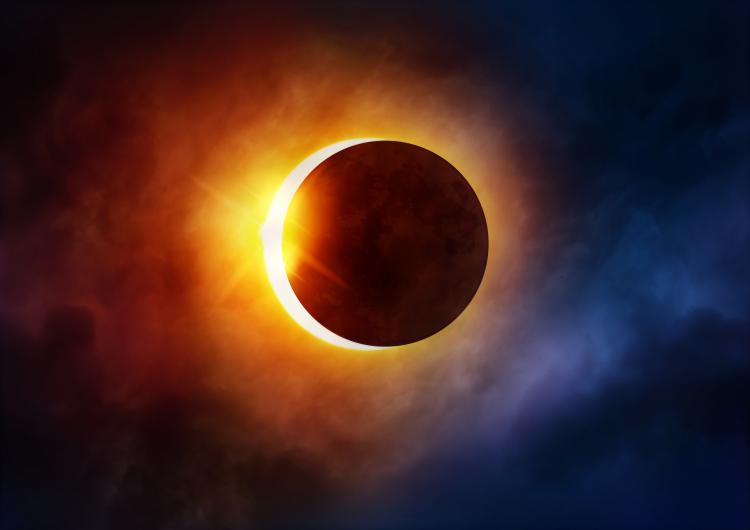The 2017 Eclipse Has Come and Gone, but What Secrets Did It Portend? Some Insights From the Jewish Middle Ages

In 1218, an army of Crusaders landed in Damietta, an Egyptian town in the Nile River Delta ruled by the Ayyubid Sultan Al-Kamil. They were greeted shortly thereafter by a heavenly omen, described by the German-born canon and schoolmaster Oliver von Paderborn, who chronicled the military expedition:
Soon after the arrival of the Christians there was an almost total eclipse of the moon. Although this very often happens from natural causes at the time of the full moon, nevertheless… we interpreted the eclipse as unfavorable to the Saracens, as if portending the failure of the ones who ascribe the moon to themselves, placing great weight in the waxing and waning of the moon.1
In Oliver’s estimation, the moon symbolized the fortunes of Damietta’s Muslim defenders, since Islamic ritual and liturgical life are oriented around a lunar calendar. The moon’s obstruction by the sun thus portended victory for those who followed the solar calendar, namely the forces of Christianity. And sure enough, the following year, after a lengthy siege, the city fell to the Crusaders (though it would be retaken by the Ayyubid forces just two years later).
Oliver’s attempt to find meaning in the eclipse should come as no surprise. As Bernard Silverster put it, for medieval observers “the sky is like a book, with its pages spread out plainly, containing the future in secret letters.”2 Anyone who could properly “read” the portents in the sky gained access to knowledge of future events. More surprising, however, is the fact that Oliver’s specific interpretation of the 1218 eclipse could just as easily have been written by some of his Jewish contemporaries. Centuries earlier, the Babylonian Talmud had laid out the following scheme for interpreting eclipses:
Our rabbis taught: when the sun is eclipsed, it is a bad sign for the gentiles [‘ovde kokhavim]; when the moon is eclipsed, it is a bad sign for the children of Israel [son’ehem shel yisra’el]. This is because Israel measures [time] according to the moon, and the gentiles according to the sun.3
The Talmud went on to list some of the specific misdeeds that would lead to these “bad signs.” They range from the mundane—e.g. forging financial contracts, bearing false witness—to the more harrowing, such as rape and murder. Fascinatingly, the Talmud singles “sodomy” (mishkav zakhar) as a specific cause of solar eclipses, presumably since homosexual acts were considered “contrary to nature” and hence as contributing to the breakdown of the natural order.4 (Though the eleventh-century exegete Solomon ben Isaac of Troyes, aka Rashi, remained puzzled by the cause-and-effect: “I have not heard any explanation for this matter” he admits.)
Thirteenth-century German Jews took the Talmud’s warnings and ran with them. In the view of Rabbi Judah the Pious (Speyer and Regensburg, d. 1217), eclipses were not uniquely portentous. Rather, any apparent deviation from the natural order should serve as a prod to reflection and repentance:
If one were to ask: Doesn’t the created world change at times? Such as a chicken that lays two eggs in a day, or a woman who gives birth to triplets, or a tree that blooms twice in a year… One should take such cases to heart and repent… Similarly, if a chicken crows [like a rooster], or a dog cries and drags itself around outside on its tail—although it appears to be pagan superstition, in order to assuage one’s concerns they may slaughter the chicken or drown the dog. In all such deviations, one must repent… as one would when there is a solar or lunar eclipse.5
The dual response Judah prescribes—repent, but also be sure to kill the animal that behaved “contrary to nature”—illustrates an apparent paradox in the medieval attitude toward exceptional natural phenomena, including eclipses. Medieval Jews and Christians alike understood the mechanics of eclipses and could predict them with precision. As Jeremy Brown notes in a recent article, subsequent readers of the passage in Tractate Sukah took pains to reinterpret the chain of cause and effect that it lays out: if eclipses are predictable natural phenomena, it makes no sense to tie them to specific sinful triggers.6 But is it necessarily the case that understanding the mechanics of natural phenomena drains them of their theological or moralistic implications? Judah’s hedging renders the matter ambiguous. Judah and his students were careful readers of late antique and medieval Hebrew astronomical texts and likely understood the etiology of eclipses—just as they surely knew that the birth of multiple children in a single pregnancy or the laying of two eggs in a single day were uncommon, but hardly unheard of, much less miraculous or supernatural, occurrences. Judah admits that killing a chicken or dog that behaves strangely looks an awful lot like misguided (and biblically proscribed) pagan superstition (darkhe emori)—but he recommends it nonetheless! Indeed, Judah’s ambivalence is mirrored in Oliver’s contemporaneous decoding of the meaning of the 1218 lunar eclipse. His efforts to divine its underlying theological meaning go hand-in-hand with his explicit awareness that lunar eclipses “very often happen from natural causes at the time of the full moon.” Natural causes and meaningful portents might have struck some subsequent interpreters as strange bedfellows, but for at least some thirteenth-century religious thinkers, they could dwell comfortably together.
Elsewhere in the same work, Rabbi Judah reflects more explicitly on the theological stakes of natural consistency and predictability:
“There is nothing new under the sun” [Eccl 1.9], so that man should never think that something occurs against God’s will, or that maybe a second [divine] power can abrogate the actions of the first one. It is for this reason that [God] set the time and duration of reproduction, each animal and plant species as is customary for it, and the times of planting and harvesting, each in its proper time. And he has never changed and never will change these customs… This is in order that one not think that there is a second God who can contradict the first God. Thus, our sages have said, “The world follows its customary course [‘olam ke-minhago noheg] in all matters.”7
As I have argued in a recent book (published with Penn Press in the Center’s series Jewish Culture and Contexts), medieval Jews and Christians increasingly understood the natural world to be replete with spiritual profundity and saw the exploration of nature as both scientifically and spiritually efficacious.8 The procession of the heavenly bodies, the duration of the reproductive process, and the cycle of the agricultural year are not merely the mundane backdrop to spiritually resonant portents like eclipses. Rather, both the conventional workings of the natural order and their seemingly wondrous exceptions are grist for the theological mill, and both need to be studied, compared, and reconciled in order to make sense of the relationship between God and the world that he created. For Judah, eclipses and other uncommon phenomena merit special attention not because they disrupt an otherwise prosaic and spiritually neutral natural order, but precisely because that natural order is intrinsically meaningful and awe-inspiring.

By any measure, 2017 has been a portentous year—would that a latter day Judah or Oliver could decode the “secret letters” that are, per Bernard Silvester, “spread out plainly” in the sky. But the consuming popular interest in and international media coverage of yesterday’s eclipse implies that even in the mechanistic and scientifically comprehensible cosmos that we inhabit, certain natural phenomena jolt us from our complacency and remind us to marvel at the workings of the apparently mundane natural order. If the underlying meaning of the eclipse remains obscure, perhaps the ruminations of medieval Jewish and Christian stargazers can prod us to reflect upon how even the predictable and comprehensible workings of the natural order might nevertheless inspire wonder and even transcendence.
[1] Oliver of Paderborn, Historia damiatina 10, ed. H. Hoogeweg, Die Schriften des Kolner Domscholasters…Oliverus (Tübingen, 1894), 178; trans. Robert Bartlett, Nature and the Supernatural in the Middle Ages (Cambridge, 2008), 65.
[2] Bernardus Silvestris, Cosmographia 2.1.3, ed. P. Dronke (Leiden, 1978), 121; trans. Bartlett, Nature and the Supernatural, 63.
[3] bSuk 29a.
[4] This link was propounded in the thirteenth century by such authors as Alan of Lille in his De planctu Naturae. On the broader application of natural philosophy to the understanding of “sodomy” in the Middle Ages, see Joan Cadden, Nothing Natural Is Shameful: Sodomy and Science in Late Medieval Europe (Philadelphia, 2013).
[5] Imrot tehorot hitsoniyot u-penimiyot le…R. Yehudah he-Hasid, ed. Y. Stal (Jerusalem, 2006), 50–54.
[6] Jeremy Brown, “The Great American Eclipse of 2017: Halachic and Philosophical Aspects,” Hakirah 23 (2017): 171–80.
[7] Imrot tehorot, 49–50.
[8] David I. Shyovitz, A Remembrance of His Wonders: Nature and the Supernatural in Medieval Ashkenaz (Philadelphia, 2017).
